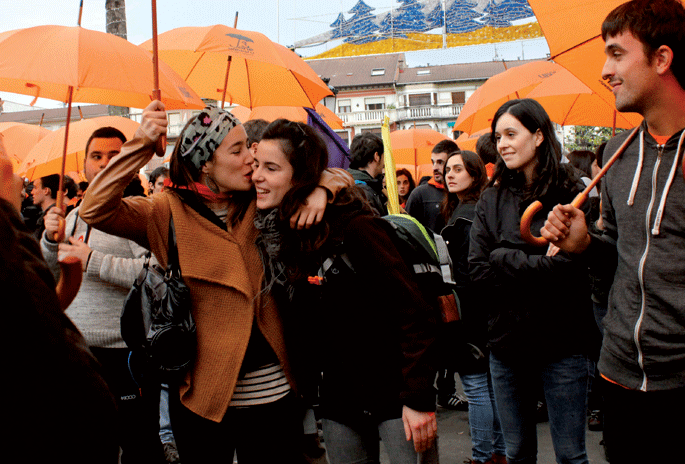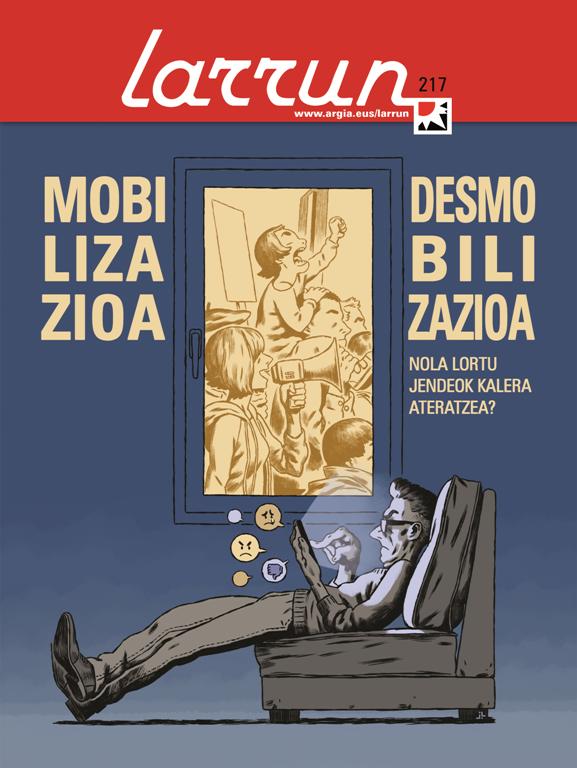The anti-stop movement is moving forward
- On Monday, the Ertzaintza arrested Jone Amezaga of Errigoitia, who had a search and arrest warrant against him, after more than 20 days, hitting his environment and using extensible porras. Thrown in one way or another by hundreds of people, they have built for almost three weeks the practice of disobedience. New elements have been put on the table, as well as new questions.

“I’m very happy to be out here, supporting so many people and turning Gernika into a free people.” These are the words of Jone Amezaga, who, after 18 days of absence, went out to the street on Saturday and told them to Argia. The neighbours supporting Amezaga have filled the village with posters, scarves, balloons and orange umbrella. Last weekend he received the solidarity of several hundred people and on Monday, surrounded by some 70, he was arrested on the market by the agents, after beating around him with extendable gowns.
This case has had some peculiarities, including that Amezaga has not been in a fixed place since she appeared on the site until she has been arrested. The activities have been organised in three main areas, and over the weekend the case has had a great impact on Gernika. There's also been a huge movement in social media.
Unlike what has happened in other walls, Amezaga has not been present at all times, and they have taken advantage of the two pasacalles that have been made in the locality to leave for three or four hours, with the objective of deepening the idea of “living in freedom in Gernika”. Groups identified by colors were organized, had the Ertzaintza come, which would have opened the umbrellas and agreed on the possibility of separating them separately. The people who have been to Gernika will remember the Tutti Fruti initiative, a very colorful initiative. In the Donostia-San Sebastian Free Space, the columns have been moved from one place to another in the village of Amezaga.
The spokesmen of the dynamic indicated that, for security reasons, Amezaga has not spent the night in the street and that the solidarity who have come to the site have slept in the houses and premises of the people.
The National High Court has sentenced Jone Amezaga to 18 months in prison for "the uprising of terrorism", considering that he placed a banner with the ETA symbol. Amezaga denies that the banner was placed by him, describes it as a "police assembly" and denounces that he wants to stop because of his political activity.
A year ago the Jone Libre platform was launched in Gernika to report the case under investigation. Since then, in addition to disseminating information to the people, once the arrest warrant has arrived, the issue has taken on a new dimension. They've held assemblies of over 100 people, they've got adhesions, they've put dozens of videos into the network ...
Family angry with the Ertzaintza
“This is the case that from the beginning has been formed by ertzainas, that’s the saddest thing.” Jone's mother, Itziar Amezaga, has been outraged by the Basque Government. “It has been completely prefabricated, the Ertzainas have brought the case to the Spanish National High Court and have then reached out to ensure that this punishment is complied with.” In an interview on the Argia website, it is added that the Secretary General of Peace and Coexistence, Jonan Fernández, has called for the dissolution of the aforementioned tribunal. Cholera is evident: “It is good that you ask for it, but that the government does not use it to judge Basque citizenship.”
Although Judge Ángela Murillo ordered the Civil Guard and the Spanish National Police to arrest Jone Amezaga, the Ertzaintza has taken an active stance. The Director of Intelligence of the Ertzaintza made it clear that he wants to avoid the popular walls, although to do so he has to ask the National Court to make legal modifications, according to the documents published by Argia.
It has been a year and a half since the Basque Government was urged not to send the Ertzaintza from the Donostia-San Sebastián Free Area. In addition to sending the Autonomous Police, without asking him, the Ertzaintza has positioned itself against the village walls. This report reveals that popular walls are an effective instrument for influencing the political scene.
In addition, unlike Loyola and Deusto, Jone Amezaga left the weekend at the time when the Ertzaintza did not go to comply with the Spanish court order. This has been a topic of conversation for many of the people there meeting. Did the Ertzaintza know the plan?
Movements against arrests
The case of Gernika has led to political movements. According to Busturialdeko Hitzak on 12 December, an ertzaina has called, among others, for the suspension of Jone Amezaga's prison resolution to the Ertzaintza. The municipalities of the region have also approved declarations, some of which have received the support of the PNV.
The bowels of the movement for disobedience are also moving. In recent months, in the villages where Elea and the cases of political trials live closely, Free Working Groups are gathering together to create a common dynamic. A colleague involved in this process has told ARGIA that “the phenomenon of the popular walls has the capacity to generate in people an illusion and a passion that today is so difficult to ignite”. In his opinion, disobedience “fills” people as a form of struggle. “In addition to dealing with political judgments, it activates the citizens and if it is successful, as we have seen in several experiences, it has the capacity to attract other sectors of society.”
Little by little, the details of the Libre dynamic, the form and direction in civil disobedience and in participatory actions, “away from partisan schemes” are being redefined.
Some new questions
Given the position of the Spanish Government and the National Court, can the arrests be ended without ever raising disobedience?
Among those who want to change society, the eternal debate is among those who think that priority must be placed on popular movements and those who advocate putting it in official institutions. What is the current trend in Basque Country? Where are the trends going?
What path will the neighborhoods of Segura and the Herriko Tabernas take?
In the case of political trials, is there any initiative more effective than a popular wall in influencing politics?
The Ertzaintza tries to prevent, in some way, the popular walls, even if to do so it has to ask the National Court to open new avenues of justice. What support does the attitude of the Ertzaintza have in Basque society? And between the Jeltzales?
Loiolako herri harresian atxilotu zituzten Esteban Orbegozo azpeitiarraren eta Beñat Hach Embarek ormaiztegiarraren kontrako epaiketak eta prozesuak eragin dituen gastuei aurre egiten laguntzeko bertso saioa izango da ostiralean, Azpeitiko Gaztetxean. Aitor Bizkarra,... [+]
Alcalá de Henareseko epaitegian izango da 50 lagunen kontrako epaiketa. Bost hilabeteko espetxe zigorra eskatzen dute bakoitzarentzat 2015eko epaiketa batean publiko gisa herri harresia irudikatzeagatik eta gazte auzipetuei babesa emateagatik.
Euskal gazteriaren aurkako Espainiako Estatuaren errepresioaren erdian, 2014ko irailaren 22an, Loiolako Basilikaren eskalinatan Herri Harresia egin genuen, epaiketara aurkeztu ez ziren bost euskal gazteak babesteko asmoz. Bertan izan ziren, beste ehunka herritarren moduan,... [+]
Esteban Orbegozo eta Beñat Hach Embarek zigortzea erabaki du Gipuzkoako Lurralde Auzitegiak, ertzain bat zauritu izana leporatuta. Dirua biltzeko hainbat ekimen antolatuko dituzte.
























